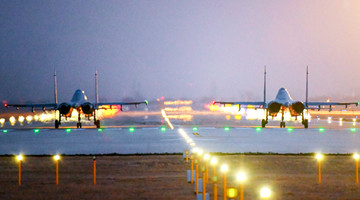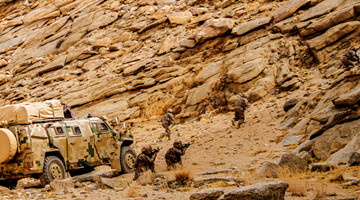
The international market share of China's private positioning service providers based on the BeiDou Navigation Satellite System (BDS) will continue to quickly grow globally, as the system is scheduled to achieve full coverage of the countries and regions along the Belt and Road route in 2018, according to Guo Xinping, the founder and CEO of the UniStrong Science & Technology Co, one of China's top GNSS companies.
Guo made the remarks in an exclusive interview with Global Times on the sidelines of the technology firm's annual global partners summit held in Shenzhen on Wednesday.
The company is estimated to have nearly doubled its annual income in 2017, reaching 2.3 billion yuan ($360 million) with net profits of 250 million yuan, a 160 percent year-on-year increase, according to the Unistrong founder's keynote speech at the summit.
Furthermore, 2017 saw the company achieve rapid and wide expansion of its business worldwide on an unprecedented scale, after it successfully laid out subsidiaries for its Asia-Pacific regions in Thailand, Pakistan and Japan. It also set up a China-UK "One Belt One Road" Global Innovation Center in Nottingham, UK. The company now possesses a global business coverage and service covering more than 90 countries and regions.
Guo explained that his company chose the facilities' locations carefully - the UK and China being the most representative of Western and Oriental cultures in the modern world.
Forming networks
The Long March-3B carrier rocket took off from the Xichang Satellite Launch Center carrying twin satellites, coded as the 26th and 27th satellites in the BeiDou Navigation Satellite System (BDS), on January 12 and two more on February 12, the Xinhua News Agency reported.
The four satellites form a network with two previously launched BeiDou-3 satellites.
The satellite navigation system will provide services for Belt and Road countries in 2018, and form a complete global satellite navigation system by 2020.
The current positional accuracy of the BeiDou system is around 2 to 5 meters, and with the help of ground stations, this accuracy can increase to within one meter for free services, and even a centimeter for paid services, Shen Jun, deputy head of the China National Administration of GNSS and Applications, and also the chief scientist of UniStrong, told the Global Times on Wednesday.
The BeiDou-3 satellites are installed with even more accurate timing devices, making them work more precisely and faster, Shen added.
As BeiDou completely covers the Belt and Road regions in the near future, the robust satellite constellation will back the company's overseas expansion, Guo said.
Private firms have unique strengths in promoting such technology services, as they are viewed more as business competitors in the global market as opposed to their State-owned counterparts, Guo said.
Growing value
According to an industry white paper, the overall output value of the GNSS and location-based services market in China reached 211.8 billion yuan in 2016, up 22.06 percent from the previous year. And for the industry's core output, BDS contributed 70 percent.
Farlin Halsey, CEO of Hemisphere GNSS USA Inc, saw the future of the BeiDou system as "absolutely promising."
Halsey told the Global Times that BeiDou is a newer and high-accuracy constellation, which means you can now get more signals when working in difficult situations.
The autonomous-driving vehicle industry will have to leverage all the constellations to perform safely with the BeiDou system, Halsey added.
When it comes to surveying and mapping harsher environments, more constellations matter a lot, as it provides more data and therefore more reliable information, Mauro Colombi, Vice President of Operations at Stonex, one of the world's leading measurement and survey companies, told the Global Times.
The accuracy and analysis of the BDS system and products are very good, Colombi added.
Constellations are not competitors with each other but are complementary, and as the BDS covers more regions, it is natural that no matter where you are in the world, you will be able to not only get good positioning but also at quick speed and this will drive commerce and new entrepreneurial ideas for new start-up companies, Halsey added.
The two entrepreneurs also agreed that whether the system is Chinese or not, the BDS will help their products improve.
"Now BDS has been applied to almost everything: transport monitoring, survey and mapping in Indonesia, you name it. All I wish now was that we could use the BeiDou 3 soon," Rega Himawan, CEO of WiBB, an Indonesia-based surveying company, told the Global Times.









